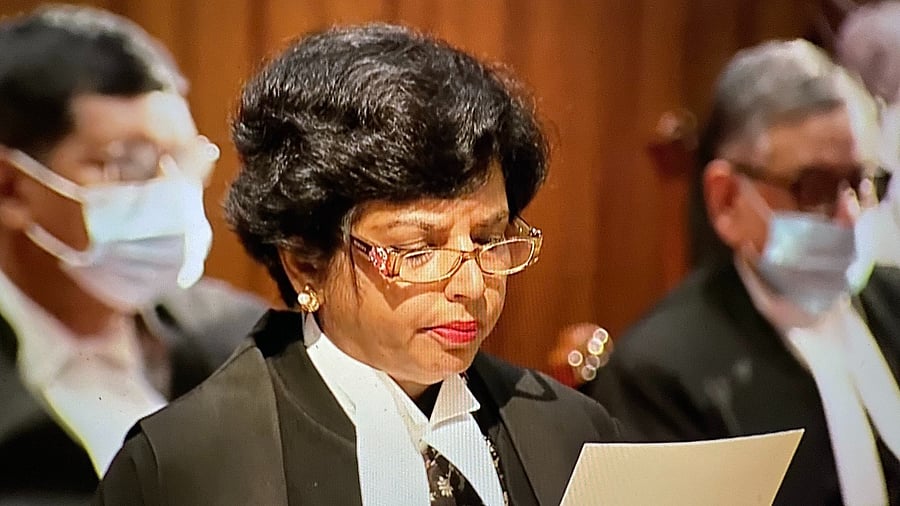
Justice Hima Kohli.
Credit: X/@sonalgoelias
New Delhi: Retired Supreme Court judge Justice Hima Kohli has advocated for a robust national climate law, saying the current environmental legislations are often fragmented and insufficient to tackle the complexities of climate change.
Addressing an event on the topic "Climate Liability, Justice, and Jurisprudence" on Friday, she also said the top court's landmark judgment in the M K Ranjit Sinh case paves the way for strengthening India's environmental laws and integrating human rights into climate discussions.
"There is a pressing need for comprehensive legislation dedicated specifically for climate change. India has several environmental laws in place, but they are often fragmented and sometimes found to be insufficient to address the multifaceted challenges posed by climate change.
"A robust national climate law grounded in constitutional principles and aligned with international obligations is, to my mind, the way forward," she said.
Justice Kohli said such legislation should include provisions for climate adaptation and mitigation, mechanisms for holding both state and non-state actors accountable, and modalities for compensating communities affected by climate-related disasters.
The law should also prioritise vulnerable populations, ensuring that they have access to resources, legal remedies, and protection from climate impacts, she said.
"While continuing to interpret existing laws expansively in the interest of protecting the environment, the judiciary can recommend the creation of such legislation through its orders and, as a title, fill in the gaps with affirmative directions as it has been doing in the past," Justice Kohli said.
Hearing the M K Ranjitsinh and Others vs. Union of India case, which stemmed from concerns over the impact of overhead power lines from renewable energy projects on the Great Indian Bustard, the Supreme Court, in April this year, recognised the right against adverse effects of climate change as a distinct fundamental right.
The case evolved into a broader discussion on balancing climate action with other conservation measures, with the government arguing that the power transmission lines were essential to India's climate change response.
Justice Kohli said the M K Ranjitsinh case has paved the way for a new era of climate litigation, where the protection of the environment is inextricably linked to the fundamental rights of citizens.
The judgment is likely to strengthen India's environmental laws by establishing a holistic legal framework for addressing climate change, she said.
"It empowers citizens to challenge deficient or insufficient climate action. This decision of the Supreme Court is also a step forward towards integrating human rights in the climate discourse and positions India to influence global climate change policy... The ruling in this case enhances India's credibility as a committed climate change leader. It can serve as a model for other nations," she said.
Justice Kohli said public interest litigations (PILs) have a crucial role in advancing climate justice in India but cautioned against their misuse for frivolous or political motives.
"Public Interest litigations have been a powerful tool in India's legal system, particularly in the realm of environmental protection... Moving forward, PILs can play a pivotal role in advancing climate justice in India by empowering civil society to challenge inadequate climate action by governments, corporations, and public bodies," she said.
"The future of PIL in climate litigation remains promising, but it must be ensured that it is used with responsibility and effectively. Courts must scrutinise PILs and pick up only those that address genuine concerns and are not misused for frivolous or politically motivated purposes," the retired SC judge said.
In July, Supreme Court judge Justice K V Viswanathan called for the establishment of a permanent commission in India, similar to NITI Aayog, to find a comprehensive solution to the climate change problem.
He had said there is also a raging debate among experts about the framework of the umbrella legislation on climate change that India should adopt.